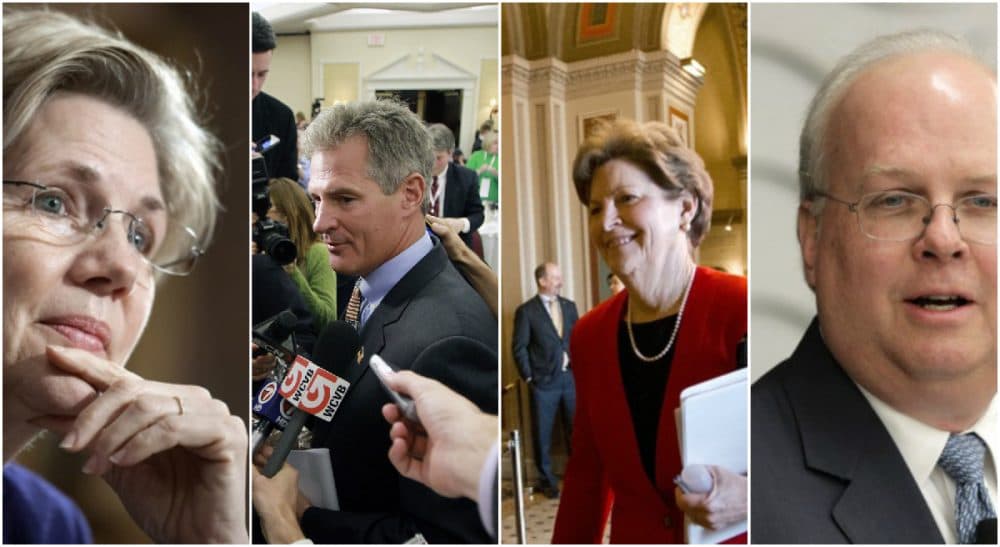Advertisement
If I Don’t Want Money To Rule Politics, Should I Give Money To Stop It?

The buzz about Scott Brown's bid for U.S. Senate in New Hampshire struck closer to home when an email from Sen. Elizabeth Warren popped up in my inbox. Her missive applauded supporters for helping raise $40,000 in one weekend to bolster fellow Democratic Sen. Jeanne Shaheen. It also decried the intention of American Crossroads, the group founded by GOP strategist Karl Rove, to spend $600,000 on a new television advertising campaign against the incumbent Granite State senator. And finally, it asked me to fight back by donating more money to Shaheen’s cause.
Do I heed [the] call to battle ... or do I keep my wallet in my pocket in the naive belief that elections should be determined by the will of the people rather than the power of the purse?
I moved the email to my trash folder. But the following morning Warren’s message festered in my mind as I puzzled the paradox of her request. If I donate money to Shaheen in order to chip away super PAC clout, I participate in the game that big money determines election outcomes. If I don’t contribute my two cents, I abdicate my ability to influence. Neither position is palatable to a person who believes votes should not be equated with dollars.
So I did what I do whenever I am confounded by the discrepancies between true democracy and modern political realities: I turned to my founding father of choice for perspective.
After serving eight years as vice president to the universally adored George Washington, John Adams became the reluctant participant in our nation’s first politicized election. Adams believed he’d earned the Office of the Presidency, but Thomas Jefferson mounted an opposing campaign. Although Adams recognized democracy’s frailty (“Remember, democracy never lasts long. It soon wastes, exhausts, and murders itself.”), he was dismayed by the trivial issues and grotesque hucksterism that marked the election of 1796. This lover of democracy, in theory, didn’t anticipate the chaos of free elections.
Adams prevailed; he served one term, and then lost to Jefferson in 1800. John Adams remained publicly optimistic about our country, if not about Mr. Jefferson. However, in the final year of his life, Adams acknowledged, “Our American chivalry is the worst in the world. It has no laws, no bounds, no definitions; it seems to be all a caprice.”
Two hundred some odd years later, nothing and everything has changed. Our democracy has endured, though our government is far from true democracy. The right to vote is broader than it was in Adams’ time, though still imperfect; while it’s harder to hear an individual’s voice. And our elections are more capricious than ever. Political parties and political bosses have lost clout. Money is king of politics, just as it is in all avenues of America life. Debate has been co-opted by grandstanding; the most audacious proclamations command the largest audience share.
As a result, our political debate is defined by the minority who — uninhibited by the actual need to govern — can stake the most outlandish positions; and single interests who stand to gain from particular policies. There is no place for reasoned discussion, no benefit in compromise, no forum for the voice of balance or reason.
Advertisement
I wish to have a voice in my country’s affairs, but I want that voice to spring from an informed intellectual contribution, not a financial one.
Which brings me back to the paradox of Sen. Warren’s email. Do I heed her call to battle against Karl Rove’s super PAC, or do I keep my wallet in my pocket in the naive belief that elections should be determined by the will of the people rather than the power of the purse?
Neither option is palatable. I wish to have a voice in my country’s affairs, but I want that voice to spring from an informed intellectual contribution, not a financial one.
Ultimately, I return to John Adams to guide my actions, but find truer solace in his son John Quincy Adams' wisdom. “Always vote for principle, though you may vote alone, and you may cherish the sweetest reflection that your vote is never lost.”
Sorry, Sen. Warren, I refuse to try to beat the likes of Karl Rove by playing at his game. Let’s create a different, truly representative, game instead.
Related:
